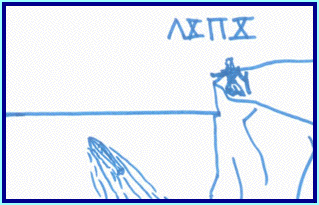MCIV
Introduction
The First One | The Previous One | The Next One | | The Last One


Khapanoze khengor ur thawlas.
"A boat will not always return."
This izanyoža derives from an old Sathir legend called Rempha me Thoš (Rempha and Thoš). Rempha, the general of the army of Ansenlas, was wife to, Thoš, a great statesman. It came to pass that the brother of the current ruler, Rage Kwesta, had been traveling in the land of the Njaamala and had had a confrontation with an Epiq fisherman. As the story goes, he chased the fisherman back to his boat, and, two days later, the fisherman's boat came back, along with twenty others. The Epiq raiding party abducted the king's brother, and took him back to their distant northern land. As a result, Rage Kwesta ordered the army of Ansenlas to sail to the Epiq homeland and rescue his brother. Thoš pleaded with the king to send a minister of peace first, to perhaps strike a deal with the Epiq people, as to avoid war, but his pleas fell on deaf ears. And so, Rempha bid goodbye to her husband, and sailed north, at the head of the fleet, to rescue the king's foolish brother.
Many weeks passed, and soon the weeks turned into months, and the months into years. Fve years had passed without any word, and it was presumed that the expedition had met with an untimely end. After awhile, everyone forgot about those that had gone, and even the king forgot about his brother. Thoš, however, spent the rest of his days waiting by the edge of the sea, hoping to catch a glimpse of the returning ship. Eventually he grew too old to walk out to the edge of the cliff from which he watched the sea, so his son would carry him out every day. Finally, one day, his son, who had grown weary of carrying his father out to the edge of the sea everyday, told his father, Khapanoze khengor ur thawlas. Thoš looked up at his son, then looked out to the sea, and then fell over dead. And that's how the story ends.
The famous words of the son of Thoš originally carried the meaning that, after awhile, one should give up hope, in order to avoid continual disappointment. Once the story began to be used in the instruction of the youth of Ansenlas, though, the izanyoža took on a different meaning. Rempha me Thoš so depressed Sathir school children that they would often become bitter and morose, taking no interest in anything, and, worst of all, regularly lashing out at their parents for no reason whatsoever (or so the parents maintained). Thus, this izanyoža became the rallying cry for angry parents all over Ansenlas, who demanded that Rempha me Thoš be banned from the schools. Now, whenever someone expects that their interlocutor is going to reveal something that they'd rather not hear, they repeat this izanyoža over and over again with their hands cupped over their ears. If that doesn't work, more often than not they'll simply run away, screaming.
Vocabulary List
- khapanoze (v.) to return, to come back; (n.) homecoming
- khengor (adv.) always
- thawlas (n.) boat, ship
- me (conj.) and (used when combining nouns)
The First One | The Previous One | The Next One | | The Last One
Introduction
Back to Sathir Main
